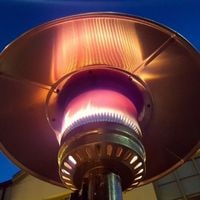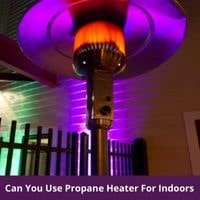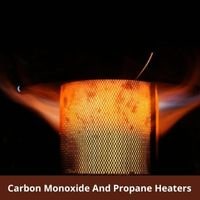Are propane heaters safe indoors
Are propane heaters safe indoors. Propane heaters are a great way to keep warm, especially in cold and icy conditions.
A propane heater is great for backup heating or as an additional option when you don’t want to use your central heater all the time.
You can find propane heaters just about anywhere these days.
Are Propane Heaters Safe Indoors

Propane heaters are sturdy and easy to use. However, there are specific steps to take to maintain safety.
As a propane-fueled system, you should be sure not to put your heater near anything flammable such as curtains or furniture that may ignite in the event of a fire.
If your indoor space requires ventilation, make sure to have good airflow throughout the room to avoid getting too hot.
Remember, propane is flammable, so you need to stay alert for anything that might trigger a fire during your time enjoying the warmth of your propane heater.
Can You Use Propane Heater for Indoors?

Yes, you can use some propane heaters indoors! There are two types of propane heaters – indoor and outdoor. Indoor models are designed to be safe for indoor use.
If you choose an indoor model, you are all set for a warm and safe experience.
Otherwise, your outdoor-only propane heater needs to be outside or somewhere with plenty of ventilation (like a garage) and a carbon monoxide detector.
There’s a good reason to double-check what kind of propane heater you get, though – because indoor and outdoor propane heaters handle the smoke they create very differently.
Propane uses fire as the heating source, releasing smoke into the air.
Differences Between Indoor & Outdoor Propane Heaters
The difference between an indoor and outdoor propane heater is how they handle smoke. Burning any combustible fuel creates different byproducts of combustion, but propane is a gas.
Making a lot more than the average solid energy source. While it’s always best to avoid fumes altogether, there’s one standard gas there can be problems with if used indoors: carbon monoxide.
Carbon monoxide is a poisonous gas that has similar effects on our bodies and equipment such as furnaces or water heaters.
Carbon Monoxide and Propane Heaters

Carbon monoxide is a severe health risk. It’s so risky because it’s colourless and tasteless, and odourless, making it easy to produce without us realizing it until it’s too late.
Carbon monoxide does have the ability to cause problems with our brains before we understand what will happen.
That exacerbates the problem by making us feel confused and disorientated, making dealing with the poison even harder.
But carbon monoxide produced from burning propane isn’t that dangerous in the air unless you let dangerous levels build up in your home.
This is because of its nature; carbon dioxide is clear and colourless, so on its own could never really pose a threat to us, but when confined within indoor spaces and left to persist in small areas, it quickly becomes life-threatening.
Propane Heater Safety Tips
As we all know, propane heaters are great for keeping away the cold whenever you need them.
However, to avoid any potential problems with your heater, it’s essential always to be a little cautious about how you manage these devices, and that is why it is a good idea to use some safety tips when taking care of these appliances:
- Install a Carbon Monoxide Detector.
- Leave a Window Open.
- Turn off the Heater If You Smell Anything Weird.
- Never Leave a Propane Heater Unattended.
- Get a Heater with a Tip-Over Safety Switch.
- Only Run Your Heater When You Need It.
- Check Your Heater for Leaks Regularly.
- Store and Move Your Heater Properly.
Conclusion
Are propane heaters safe indoors. Propane heaters are excellent indoor products to save you a bundle over the more common electric systems.
Propane space heaters are safe, cost-effective heating solutions for your home and make it much easier to control the temperature of your living room or bedroom while sparing you from using electricity all day long!
Just like any other product, though, propane heaters have their pros and cons as well. For example, they can be expensive if used with an open flame indoors.
Even worse is that propane fewer heaters will produce a dangerous level of carbon monoxide gas in confined spaces if not used correctly.
But with these safety precautions listed below, there’s no reason for you not to benefit from these dependable indoor heating solutions when winter rolls around.
Related Guides




